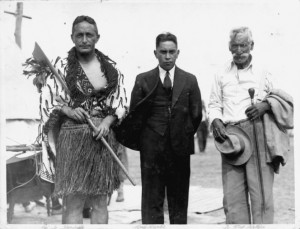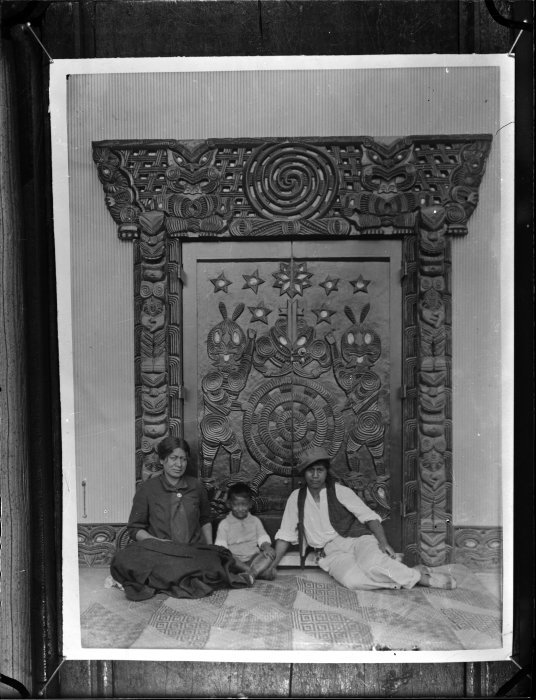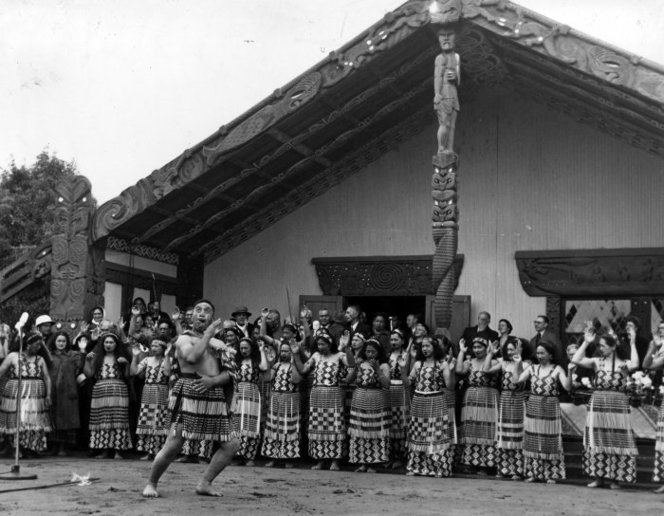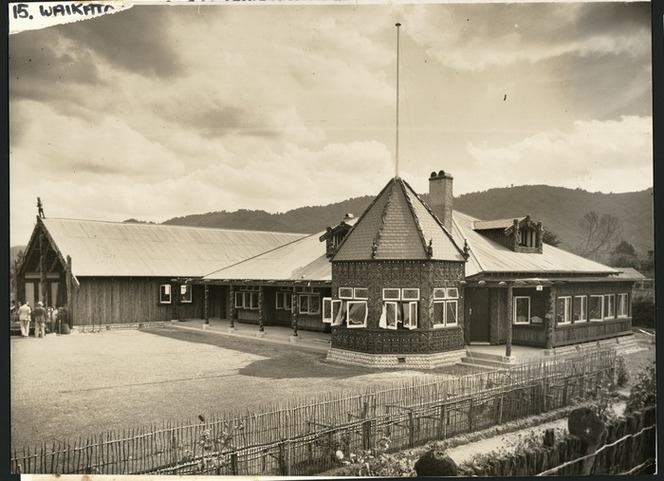The Kingitanga movement was established in 1858 due to concerns among some central North Island Māori tribes of alienation of Māori land and to give Māori leadership an equal status to that of the English monarchy. Korokī Te Rata Mahuta Tāwhiao Pōtatau Te Wherowhero was the fifth king. This week’s selected topic comes from the Today in History page at nzhistory.net.nz. The New Zealand Collection is located on the second floor of The Central Library. Each week we feature topics in the This Week in History display in the NZ Collection and using available databases and the library collections to illustrate and provide additional information.
18 May 1966: The Death of the Māori King Korokī

King Koroki Te Rata Mahuta Tawhiao Potatau Te Wherowhero and others. Ref: PAColl-0671-01. Alexander Turnbull Library, Wellington, New Zealand. http://natlib.govt.nz/records/22908707
Korokī (pictured above in the centre) was the eldest son of Te Rata, the fourth Māori king. Te Rata died in 1933 and although Koroki felt unprepared to take his father’s place and felt the people were too poor to afford to support a king, he was however crowned on 8 October 1933. His feeling of being unprepared meant he made sure his successors were well educated and better prepared for the role than he had been.

Carved door, and door surround, including the coat of arms for the Maori kings (Te Paki o Matariki) at the Turongo House, Turanga-waewae, Ngaruawahia. Godber, Albert Percy, 1875-1949 :Collection of albums, prints and negatives. Ref: APG-1501-1/4-G. Alexander Turnbull Library, Wellington, New Zealand. http://natlib.govt.nz/records/22801383
This photo shows a welcoming Haka performed before Korokī makes an official speech. You can listen to Korokī making a speech here.

Haka and action song being performed at Mahina-a-rangi meeting house, Turangawaewae marae, Ngaruawhahia. Original photographic prints and postcards from file print collection, Box 2. Ref: PAColl-5584-28. Alexander Turnbull Library, Wellington, New Zealand. http://natlib.govt.nz/records/22454670
You can read an article about the tangihana (funeral) of Korokī from the National Library website of the digitised journal Te Ao Hou here. The website describes the journal below;
Te Ao Hou was published from 1952 to 1976 by the Māori Affairs Department in New Zealand Aotearoa. According to its first editorial, Te Ao Hou aimed “to provide interesting and informative reading for Maori homes … like a marae on paper, where all questions of interest to the Maori can be discussed.
The journal can be accessed from the Māori Resources page via the Rauemi link on the Wellington Libraries website.

Creator unknown : Photograph of King Koroki’s carved house at Ngaruawahia. Ref: PAColl-9376. Alexander Turnbull Library, Wellington, New Zealand. http://natlib.govt.nz/records/22334266
Here are some of the books held in the library collection about people of note in the Kingitanga.
Koroki, my king.
“A collection of memories of King Koroki, the fifth Maori king. These memoirs have been offered by the people of Waikato” — ” The story is written at the request of Te Arikihui Te Atairangikaahu. It is to commemorate the reign of her father, King Korokī, and to acknowledge the effort and sacrifice of his people” (Inside Cover)
 Te Kingitanga : the people of the Maori King movement : essays from, The dictionary of New Zealand biography / foreword by Sir Robert Te Kotahi Mahuta, introduction by Angela Ballara.
Te Kingitanga : the people of the Maori King movement : essays from, The dictionary of New Zealand biography / foreword by Sir Robert Te Kotahi Mahuta, introduction by Angela Ballara.
“These biographies of fourteen Kingitanga leaders, from Potatau to Te Rata, tell the story of the movement in its first century. Te Kingitanga documents the struggle with colonial authority, the confiscation of over a million acres, the establishment of the aukati (the King’s boundary), the period of self-imposed isolation in which the principles of the kingdom were developed, the refusal to compromise, and the efforts to regain what was lost. This history records also the resurgence of the movement in the twentieth century.” (Syndetics summary)
 King Pōtatau : an account of the life of Pōtatau Te Wherowhero the first Māori king / Pei Te Hurinui.
King Pōtatau : an account of the life of Pōtatau Te Wherowhero the first Māori king / Pei Te Hurinui.
“This book details the background to the Kingitanga and also tells the story of the first king, Potatau Te Wherowhero. It details all the momentous events of Te Wherowhero’s life from around 1775 to his death in 1860, including his status as Lord of the Waikato and the famous battles and conflicts with other tribes, his raising up as the First Maori King, and Mana Motuhake, the Maori Kingship, set apart as the symbol of the spiritual and cultural life of the Maori. Pei Te Hurinui’s biography of King Potatau tells this story in a Maori voice employing waiata, poetry and whakapapa as well as prose text in English and English translations so that the book is accessible to both Maori language speakers and those with no knowledge of Maori.” (Syndetics summary)
 The Maori king / John Eldon Gorst ; edited with an introduction by K.O. Arvidson.
The Maori king / John Eldon Gorst ; edited with an introduction by K.O. Arvidson.
“The Māori King has long been recognised as a masterpiece of nineteenth-century New Zealand Literature. E.H. McCormick thought it pre-eminent among works on the wars of the 1860s, while Keith Sinclair considered it ‘the very best of nineteenth century account of life among the Māori’ M.P.K. Sorrenson has described it as ‘one of the classics of New Zealand Literature’.” (Inside Cover)
For added interest you can head to the Times Digital Archive which can be accessed from our newspapers page from the collection of databases at My Gateway on the library website to read a letter Gorst sent to the times that was published on the 24th December 1863. And you can read a biography of John Gorst here.
Tamihana the kingmaker / by L.S. Rickard.
From the preface it reads “It was while I was reading the new edition of Sir John Gorst’s ‘The Māori King’ that I realised that Wiremu Tamihana was one of the most remarkable men in our history and also one of its least known. In spite of the important part he took in the affairs of the 1850s and 1860s, he occupies few lines in most history books…..This work is an attempt to redress the balance.”
Te Puea : a life / Michael King.
Te Puea Herangi, whom Professor John Pocock identified as ‘possibly the most influencial women in our political history’, wanted an honest biography of her turbulent life.” (Abridged back cover)

